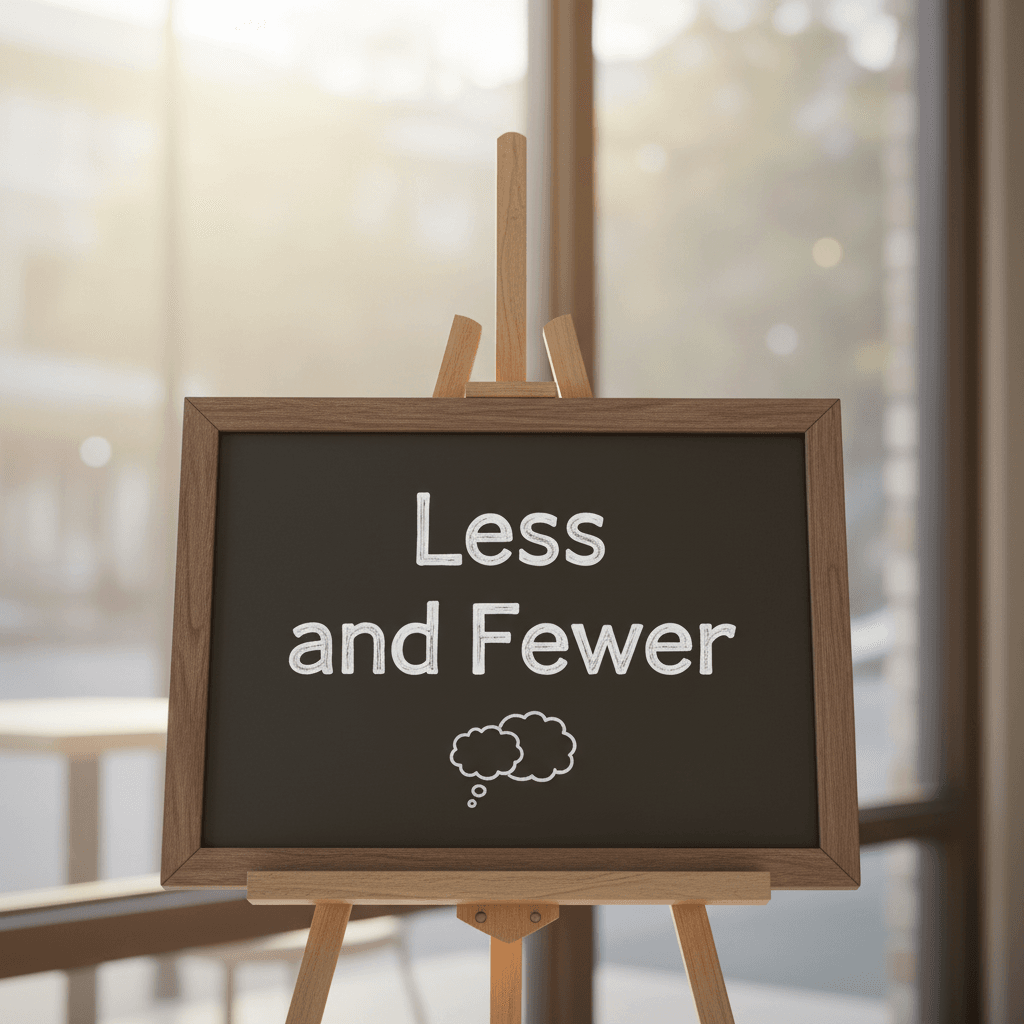Less vs. Fewer: What’s the Difference?
 Many English learners mix up less and fewer — and even native speakers do it too.
Many English learners mix up less and fewer — and even native speakers do it too.
The difference depends on whether the noun can be counted.
Here’s the quick rule:
- Fewer → used with countable nouns (things you can count individually) 🔢
- Less → used with uncountable nouns (things measured as a whole) 💧
1. Fewer: For Countable Nouns
Meaning
Use fewer when referring to things that can be counted one by one — like apples, books, cars, or people.
Examples (10 total)
- There are fewer cars on the road today.
- She has fewer friends than before.
- We need fewer meetings and more action.
- He ate fewer cookies than I did.
- There are fewer students in class this week.
- I spent fewer dollars than you did.
- We’ve had fewer problems this month.
- The new version uses fewer resources.
- You should take fewer risks.
- They won fewer games this season.
🧠 Tip:
If you can add “many” before the noun, use fewer.
“Many cars → fewer cars” ✅
“Much water → fewer water” ❌
2. Less: For Uncountable Nouns
Meaning
Use less for things that can’t be counted individually — like water, time, money, or happiness.
These are uncountable nouns that refer to quantities, not numbers.
Examples (10 total)
- We have less water than yesterday.
- I spent less time on homework.
- She has less money now.
- He eats less sugar these days.
- The car uses less fuel.
- There’s less noise in the library.
- You should drink less coffee.
- They had less luck this year.
- Please use less salt in the soup.
- I have less patience for nonsense.
🧠 Tip:
If you can add “much” before the noun, use less.
“Much time → less time” ✅
“Many time → less time” ❌
3. Exceptions: When “Less” Can Be Used with Numbers
Even though fewer is for countable nouns, less is sometimes used for:
- Measurements of distance, time, money, or weight, especially in everyday speech.
Examples
- It’s less than five miles away.
- The trip took less than three hours.
- The shirt costs less than $20.
- She weighs less than 50 kilograms.
- There’s less than a week left until vacation.
💡 These are considered “singular quantities”, so less sounds more natural and is accepted by grammar guides.
4. Quick Comparison Table
| Type of Noun | Use | Example |
|---|---|---|
| Countable | fewer | Fewer people came to the party. |
| Uncountable | less | There’s less noise in the room. |
| Money / Time / Distance | less | It took less than ten minutes. |
| Things you can count | fewer | Fewer apples are left. |
5. How to Remember
👉 Fewer = number (things you can count)
👉 Less = amount (things you measure)
💡 Memory Trick:
“If you can count it, use fewer. If you measure it, use less.”
6. Common Mistakes
❌ There are less cars on the road.
✅ There are fewer cars on the road.
❌ He made fewer money last year.
✅ He made less money last year.
❌ We have fewer time left.
✅ We have less time left.
7. Why It’s Confusing
People often use less for everything because it sounds smoother.
But in writing — especially academic or professional English — using fewer correctly shows attention to detail.
Modern AI tools like Humanizey can automatically check whether to use less or fewer based on context — helping your writing stay natural and grammatically correct.
FAQs
1. Is it “10 items or less” or “10 items or fewer”?
Grammatically, “10 items or fewer” is correct, but “10 items or less” is so common that stores use it anyway.
2. Can “less” be used for plural nouns?
Yes, when referring to amounts or measurements, like less than 20 miles.
3. What’s the opposite of “fewer”?
More.
4. What’s the opposite of “less”?
Also more — it works for both.
Practice: Choose the Correct Word (“Less” or “Fewer”)
(Answers are listed at the end.)
- There are ___ students in class today.
- Please use ___ sugar in your coffee.
- We spent ___ money than last year.
- She made ___ mistakes on this test.
- I have ___ patience than before.
- He drives ___ miles to work now.
- There are ___ options available this time.
- The city has ___ traffic at night.
- We had ___ problems this week.
- You should eat ___ sweets.
Answers
- fewer
- less
- less
- fewer
- less
- less
- fewer
- less
- fewer
- fewer / less (both okay, depending on meaning)
